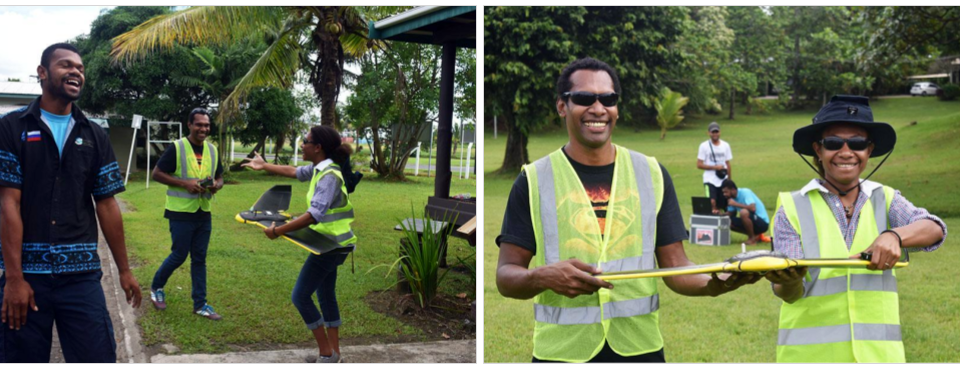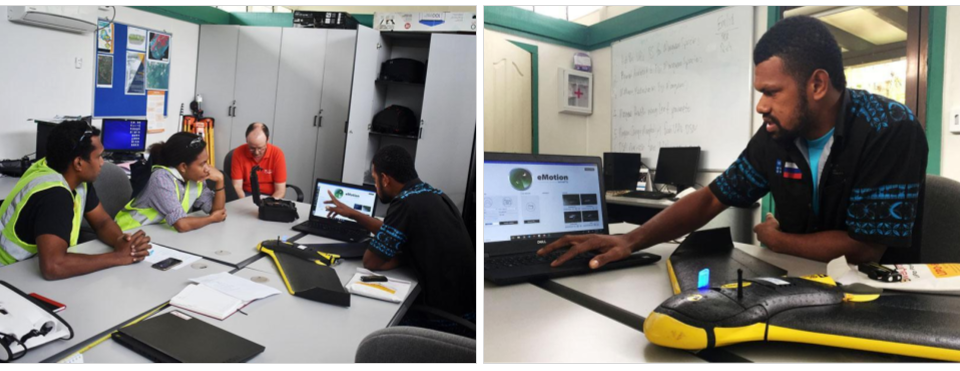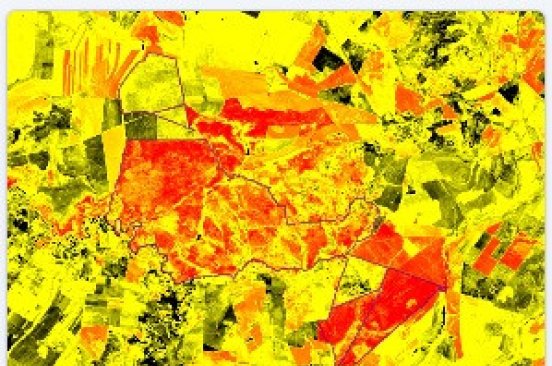
Fiji is a Leader in Pioneering Robotics Solutions, So It’s Teaching Its Neighbors How to Fly ‘Facing the Wind’
Papua New Guinea Flying Labs receives training from its neighbouring Pacific Island nation.
May 29th, 2019
By Kevin Soli, Papua New Guinea Flying Labs
 (Left) Who says eBee Training is no fun? (Right) Kevin and Sophia had completed their eBee flights.
(Left) Who says eBee Training is no fun? (Right) Kevin and Sophia had completed their eBee flights.
South Pacific Regional Flying Labs (SPFL) recently organised a one-day professional Flying Labs training in Fiji for Papua New Guinea (PNG) Flying Labs. These hands-on training are key to local capacity building efforts in the region as they provide the skills and appropriate robotic solutions that we need to scale the positive impact of our humanitarian, development and environmental efforts in PNG and the Pacific.
Taking place after the 2nd Annual South Pacific Robotics for Good Conference, this training focused on senseFly eBee, a fixed-wing drone with a 50-minute flight time, and advanced 3D planning features, which make it ideal for PNG’s mountainous terrains, vast plains and plantations. Ms. Amrita Lal, Coordinator of SPFL successfully organised the training with her in-house staff.
 (Left) Kevin and Sophia listening attentively to Semisi as he gives his introduction. (Right) Semisi from South Pacific Flying Labs demonstrating the use of eMotion software.
(Left) Kevin and Sophia listening attentively to Semisi as he gives his introduction. (Right) Semisi from South Pacific Flying Labs demonstrating the use of eMotion software.
Mr. Semisi Ketenilagi, a local SPFL drone pilot who has extensive knowledge and experience with the eBee Classic led the training with the assistance of Mr. Waisale Rakusa. The training was specifically geared towards two coordinators from PNG Flying Labs, Kevin Soli and Sophia Soli. The first part of the training included brief introduction followed by identification of parts of the eBee and their specific functions. The second part consisted of Mission Planning using eMotion software Version 3 with flight parameters set according to the Civil Aviation Authority of Fiji along with customizations for take-off and landing. Ground resolution and overlap of the mapping site affect both altitude and flight time. The fun part of the training was launching the drone into space while facing the wind! "Facing the wind" is part of the eBee launching standard operating procedure (SOP). The wind helps the drone with its lift for its pre-planned flight.
The USP playground was where all the action took place. Once the mission was complete, data transfer for processing was conducted back at the lab.
Through Fiji’s lead in pioneering of robotic solutions to utilization of drones, it is natural for PNG to learn from its neighbouring Pacific Island nation. Regional collaboration opens doors for expanding coverage of drone solutions and business opportunities. After the first cargo drone for medical delivery workshop and demonstration using a VTOL drone (drones that take off like helicopters and fly like a plane) in PNG, there is a sense of growing interest in-country to explore other use-cases, and so eBee would be considered a good fit. The agriculture and forestry sectors can benefit from eBee’s fully autonomous and high precision flights.
Kevin and Sophia’s visit to Fiji served as a scoping mission to learn and explore means of utilizing SPFL’s technical expertise for use of drones to address cross-cutting issues such as climate change. There is also a great need to have a regional hub to train and certify licensed drone pilots. The Flying Labs are a good vehicle to start the conversations to establish new projects and partnerships with in-country institutions and businesses.
The training was complemented with great Fijian hospitality by Assoc. Professor Rollings and Ms. Lal and her team. Travel and accommodation of the PNG team was made possible by WeRobotics.
Category(s)
Location(s)
Recent Articles
View All »

Wildfire Assessment and Web Application in Sao Paulo
